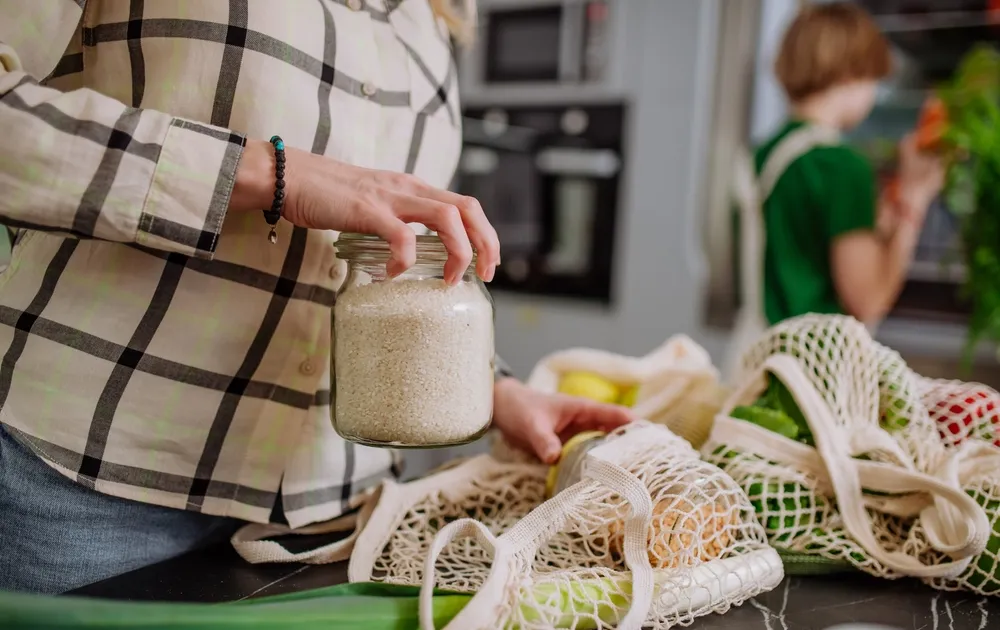Living a sustainable lifestyle doesn’t have to mean making huge sacrifices or drastic changes. Even small, thoughtful actions can make a big difference for the planet and your well-being. From the way you shop to how you use energy at home, simple habits can add up to meaningful environmental impact. By being more mindful of everyday choices, you can reduce waste, save money, and contribute to a cleaner, healthier future for everyone.
 Shutterstock: Halfpoint
Shutterstock: Halfpoint1. Ditch Google Search
Did you know it’s possible to be more eco-friendly simply by switching search browsers? All you have to do is start using Ecosia. This no-fee browser extension dedicates 100 percent of its profits to climate action. At least 80 percent of that money goes toward tree-planting projects with a focus on native species where they’re needed most.
So far, more than 150 million trees have been planted in over 30 countries thanks to Ecosia users and its search ads. For example, Ecosia partners with local organizations in Brazil to help protect endangered plants and animals. The company is powered by solar power which produces twice the amount of energy needed to power all user searches.
2. Eat Less Meat
Depsite how tasty meat products are, meat consumption has some of the worst environmental impacts. The Guardian reports that meat production leads to consequences like:
- Deforestation to make room for livestock;
- Emits high levels of methane from cows and fertilizers, and;
- Pollutes landscapes.
While production is the biggest problem when it comes to meat practices,you can do your part by eating less meat. Try having one day a week where you replace meat with plant-based ingredients instead. This can reduce your carbon footprint and inspire you to get creative with non-meat meal ideas.
3. Swap Out Your Showerhead
The amount of water used in your everyday life can add greatly to your ecological footprint. The Environmental Protection Agency reports that nearly 17 percent of residential indoor water use is showering. For the average family, this adds up to nearly 40 gallons per day.
Besides doing your best to cut your shower time, you can switch to a more efficient showerhead.
WaterSense showerheads use no more than two gallons of water per minute. By switching to a showerhead with this label, the average family could save 2,700 gallons per year. More than 260 billion gallons of water could be saved if every household installed a WaterSense showerhead.
4. Switch to Shampoo Bars
Another shower habit to consider letting go of is purchasing shampoo bottles. Instead, try out shampoo bars. These products are similar to body soap bars and are a lot better for the environment. For starters, it won’t contribute to the nine million tons of plastic that ends up in the ocean annually.
Since most shampoo bars have no packaging (except for paper boxes in some cases), they are a zero waste product. They’re also made with natural ingredients and will last two to three times as long as bottles, saving you money in the long term.
5. Buy Less Clothes
Shopping for new clothes can be really fun, but the impact fast fashion has on the environment is alarming. CNN reports that 80 percent of all clothing is sent to the landfill or incinerated. Additionally, it’s estimated that over 551,000 tons of plastic microfibers pollute the ocean annually from washing clothes.
To lower your impact, start by purchasing less clothes and working with what you already have in your closet. You might be surprised at how many unused pieces you already own and have forgotten about. Here are some extra tips to try out:
- Shop secondhand and sustainable brands;
- Purchase clothes you’ll wear at least 30 times;
- Invest in staple pieces over trends;
- Shop in person instead of online, and;
- Unsubscribe from retail store emails.
Find More Sustainable Living Tips Online
There are plenty of things you can do to lessen your impact on the environment. From using less water to ditching plastic to swapping out some household products, living a sustainable lifestyle doesn’t have to be complicated.
You can easily discover more ways to help the environment. You can learn about simple adjustments and habits that will lower your overall ecological footprint. Just you wait… after some time, the new way of doing things will be your new norm.
